- Home
- Warwick Deeping
Valour Page 2
Valour Read online
Page 2
A ragged laurel hedge surrounded the garden, and behind it a girl was cutting the grass edges with a pair of shears. She appeared to be expecting someone, for she looked over the hedge from time to time and watched Hammersly crossing the common.
She was a tall girl with a mass of rich brown hair, bright red lips and a quick colour. At the first glance a man might have thought nothing of her face. It was rather broad and sun-tanned, the mouth too big, the cheek bones slightly prominent. Her eyes were large, of a blue-green colour, and set well apart under straight brows. You noticed at once the redness of her lips and her white, strong teeth. Yet there was a human and spiritual attractiveness about her face. It promised mystery, elusiveness, passion, though there was a tinge of bitterness about the mouth and an expectation of sadness in the eyes.
“Janet!”
He was at the gate, and she turned to meet him, dropping the shears points downwards in the grass.
“Hallo!”
His eyes were the eyes of a lover, and though they found an answering light in hers, she was very much the queen of her own soul.
“You got my letter?”
“Yes. And you are going out?”
“We are supposed to sail about the 30th. They are sending me out unattached.”
“What does that mean?”
“I shall be tacked on to something when I get out there. Utterly unsatisfactory, but everything is unsatisfactory about this war. What’s the use of being proud of your unit, and getting to know your men! The volunteer is just a dog.”
There was a suggestion of pain deep down in her eyes.
“It is hard. I suppose they can’t help it.”
“The English haven’t any imagination. We deal in labels and tins of meat, and returns, and vouchers; of course it is trying to be thorough. The fact is, in this war, we are like a man late out of bed and dressing in a furious haste to try and catch the train.”
She smiled at him.
“Will you come in and see mother?”
“Of course. How is Mrs. Yorke?”
“Not very strong. But come in.”
She repeated the invitation in a way that made it a challenge, and Hammersly was sufficiently sensitive to understand her meaning.
“And afterwards?”
“Well——?”
“I want to talk to you, Janet. Let’s go down into the woods. Will you?”
“Perhaps.”
She pulled off her gardening gloves and took Pierce into the cottage. It was most simply furnished and with studied taste. The tall clock in the hall, the Sheraton bureau, and the Hepplewhite chairs in the drawing-room were genuine, and in fine condition. Japanese matting, and plain cord carpets covered the floors. The walls were distempered a soft amberish buff. Here and there a little picture in oils gleamed out with rich colour.
The Yorkes had been unfortunate. Wentworth Yorke had died in prison after being sentenced to five years’ penal servitude for fraud. His wife, fortunate in possessing a little income of her own, had fled with long-legged, quick-coloured Janet to some place where they could be as proud as they pleased. And Janet had put up her hair, lengthened her skirts, and taken the world’s challenge to herself. Scarshott had attempted to be kind to the Yorkes, pityingly, tolerantly kind, but Janet had refused all pity, and refused it with a fierceness that had offended some of the Scarshott ladies.
Mrs. Yorke held out a tremulous, blue veined hand to Hammersly. She was a frail old lady, with a high colour and frightened eyes. She talked in a kind of breathless way, not merely because her spirit was broken, but because she had a heart that should have failed her years ago, in the opinion of the doctors.
“How good of you to come and see us. I hear this is your last leave. How terrible! This war frightens me so, Mr. Hammersly.”
Pierce chatted to her gently for ten minutes, and Mrs. Yorke appeared to understand things perfectly when he pretended that they were expecting him at home.
“Of course. The time must seem so short to them, Mr. Hammersly. I do hope—I do indeed hope—that you will be spared.”
It was Janet who led the way into the pine woods, not as a girl luring on her lover, but as a woman who deigned to hear what a man might wish to say to her. She did not look at Hammersly, but walked beside him with a detached air, her head held high, her eyes gazing into the deepening gloom under the trees.
“Janet, do you realise what this means?”
He was pale with the intensity of his love.
“I am human, Pierce.”
“This damnable war! Of course I expect to come back; everyone does. But you know—why I’m here?”
They were deep in the woods, the straight trunks rising all about them making a world of mystery and of silence. Twilight was drifting over the black tree tops and the bracken was turning grey.
She stood and faced him.
“What am I to think?”
“Good God, you know I love you? I came to tell you. I can’t go out there—to that hell—without the thought of you.”
She looked at him with an air of suffering aloofness.
“Perhaps I know. But I do not know yet how you love me. You remember—about my father.”
“What difference does that make?”
“Every difference. Think.”
He flushed slightly.
“You mean——”
“Try to put yourself in my place. Ought I to let you love me?”
“You can’t prevent it. Janet, what does it matter? You were not responsible; your father might have committed a dozen murders for all I care.”
She said very gently, “Do you realise that I have a devilish pride?”
“I ask for pride. I don’t want some sop of a girl with fluffy hair. I want—you.”
“Well?”
He looked at her fixedly.
“Do you imagine that I think I am conferring a favour?”
“All men do, though the best of them don’t enlarge on it. It is the other people.”
Pierce Hammersly straightened himself, with a quick, proud lifting of the head.
“By God, you are right, and I love this pride in you, Janet. Will you let me take you down to my people, and boast about my luck? I want to go swaggering through Scarshott with you at my side.”
“Do you love me like that?”
“Why, yes. How else could I love you, dear?”
Her eyes lit up with a light that was sacred.
“Pierce! You shall never regret it.”
“Regret it! Oh—my dear, isn’t life wonderful?”
She let his arms take her, let her mouth meet his.
CHAPTER III
Porteous Hammersly, from his dressing-room window, beheld a vision of youth moving light-footed over the dew-wet grass, head in air, intoxicated, exultant.
There was something so arrestive about his son’s figure, that old Hammersly paused to watch him, razor idle in one hand, half his face white lather, the other half, pink skin. Pierce was walking to and fro, head high, throat showing, like some Greek singer whose lips quivered with the rush of a rhapsody. Such glimpses of vivid moving life rouse old memories, odd intimate emotions that stirred one long ago. Old Porteous was snatched back thirty years, and made to see himself in the exultant figure of this young man.
Love may make people very obtuse or very sensitive, and it had made Hammersly very sensitive towards his son. “The boy’s in love,” was the thought that crossed his mind, “and why shouldn’t he be in love?” and then he sighed and went on scraping his chin. “Women don’t see enough of life in a place like this. They get narrow, selfish.”
He heard his wife tapping her way down the polished corridor, for she had a curiously quick and fussy step for so big a woman.
“Oh—damn!”
Porteous had cut his chin in listening to the sound of those fussy footsteps, and in thinking of the thousands of potential Sophias who were waiting to fill a man’s life with crass prejudices and boring ignorance.
> Pierce dreamed into the dining-room with a smile deep down in his eyes. His mother was buttering toast, and Porteous stood by one of the windows glancing at the morning paper.
“Hallo, had a good night, Pierce?”
“Excellent. Sorry I was late. I’ll have tea, Mater, please.”
Mrs. Sophia opened her attack.
“You are coming to the fête this afternoon, Pierce?”
“What sort of fête is it?”
“A war fête. Sir Lionel has lent his park.”
Pierce mused a moment; he was thinking of Janet and of the romantic publicity he meant to achieve.
“I’ll turn up, Mater.”
She beamed at him coldly.
“Grace Rentoul is coming to lunch.”
“Is she? Any news, Dad?”
“I want Grace to come with us. Her people are away in town.”
Pierce was disgracefully inattentive.
“I see. What about the Russians, Pater?”
Porteous Hammersly turned to the table.
“Bad news—as usual. A most regrettable setback. These Germans are cunning beggars.”
“Your porridge is getting cold, Porteous. I will order the car for two-thirty, and we can all drive over to Sir Lionel’s with Grace.”
“I say, is the Singer running?”
“Bains drove me out in it yesterday.”
“Excellent. I’ll come along in the Singer. What time is the show?”
His mother looked puzzled.
“The gates open at two, Pierce.”
“Is the affair public?”
“It is open to everybody. Perhaps you would like to drive Grace over, Pierce?”
“Thanks, but I shall have someone with me. What is it, Mater—a bazaar, and a pocketful of loose cash?”
Mrs. Sophia was frowning over her tea cup.
“Are you bringing a friend, Pierce?”
“Yes—a friend,” and Porteous, who was watching him, saw the gleam of the rebel lover in his eyes.
Mrs. Sophia saw nothing but her own particular ambition.
“Why not ask your friend to lunch, Pierce? Who is he?”
“Thanks, Mater, but I think he is booked for lunch. Is that the marmalade over there?”
His father enjoyed an inward chuckle, which was traitorous and disloyal of him. He even dared to hope that Pierce’s friend would prove to be a thing in petticoats, for the father lived in the adventurousness of the son.
Pierce left his mother reading her letters, and lighting a pipe in the hall he strolled round to the garage, where the chauffeur was changing a tyre on the Rolls-Royce.
“Is the Singer running all right, Bains?”
“Like a dream, sir.”
“I shall want her at two o’clock.”
“Driving yourself, sir?”
“Yes.”
He sent Janet a note.
“Dear,—There is a big function on this afternoon at Sir Lionel Phelps’s. I want you to come to it with me, and let me boast about you to everybody. I shall call for you with the car about half-past two. I am being good, and am spending the morning at home.
“What feeble things letters are! I am not going to reduce this great happiness of ours to bathos by trying to write about it.
“I love you. Just that.
“Pierce.”
He spent the morning with his father, trailing round Scarshott for the pleasing of the old boy’s pride. Porteous had tact, and a decent respect for another man’s reticences, even when that man happened to be his son. Despite his interested and sympathetic suspicions he made no attempt to discover the identity of that mysterious friend whom Pierce was to drive over to Milford Park that afternoon.
They strolled home in time for lunch, to find that sweet bribe ready and prepared, and shyly awaiting the coming of the potential lover. Mrs. Sophia had been broadly and bluntly suggestive, and little Grace Rentoul was pathetically self-conscious.
She flushed up, and let her eyes glimmer at Pierce with shy kindness. He just noticed her, with a kind of brotherly good will.
“Hallo. What are you turning into, Grace, a V.A.D. nurse or a munition worker?”
“I am afraid I am nothing,” she said.
Which was the bitter truth, poor child.
Pierce hid himself after lunch, for he had an unhallowed mistrust of his mother. She had a genius for creating awkward situations, and for playing havoc with innocent conspiracies. He was so determined to elude her that he took the Singer out before two o’clock, bustled the little car at a reckless pace down the drive, and made for Heather Cottage as though he were carrying urgent dispatches.
The adventure intoxicated him with its tenderness and audacity. What a day, what sunlight, what a depth of blue in the sky, what a whiteness of clouds above the pines! He was a charioteer, reckless, exultant; life went at a gallop, with laughing mouth and flashing eyes.
He bumped the car up the sandy track to the cottage, and had a vision of Janet at her window gathering up a sweep of rich brown hair. She waved a hand and scolded him.
“Half an hour early. What treachery!”
He climbed out, and stood looking up at her with triumphant tenderness.
“Why blame me? Could I help it?”
A bare white arm showed its perfect lines.
“Go away, Mr. Soldier. This is one of the most serious moments of my life.”
“Can I see your mother?”
“Yes, of course. You will find her in the veranda—round under the pergola.”
“Be merciful, Janet. Remember—I am made of human clay.”
“When a woman arms herself, my friend——”
“Then the gods look down from Olympus.”
Mrs. Yorke was very kind to him. There were tears in her eyes when she spoke of Janet.
“Of course you know what happened to my poor husband? It has made us very sensitive, Mr. Hammersly, and I must say your courage has touched me. But I want you to be frank—for Janet’s sake. Your father and mother——?”
Pierce made haste to reassure her.
“Janet will see them this afternoon. As for the courage of the thing—well, I don’t think I could help loving Janet. Besides, this war is starting life afresh for most of us.”
And then Janet appeared, a slim and gracious creature in the simplest of pale-blue frocks, with eyes that glimmered and a red mouth that smiled. She wore a black-brimmed hat that threw a soft shadow over her face, the very hat in a hundred that she should have worn. Her figure was so perfect, and her head so finely set, that absolute simplicity, a mere soft-coloured sheath, was all she needed.
Pierce’s eyes exulted in her.
“I think my car happens to be just the right colour.”
“Oh, do you?”
“Have you a coat?”
“Shall I want one?”
“Perhaps not. I see no reason for driving at thirty miles an hour.”
Janet kissed her mother, and Pierce carried her off, telling himself that she was like a flower, just as pure and natural and convincing, with no cheap tags of finery and no silly mannerisms to mar her absolute completeness. She had breed, a slim, girlish dignity, and a throat and bosom that were full of subtle and human suggestiveness.
“You look ready for conquests.”
“I——?”
He took his seat, and felt a thrill of pride in her as she slipped into her place beside him.
“I am a little frightened.”
“Of what?”
“People—everything. In a way I am defying society.”
“Dear heart, what nonsense! Well, and if we are, it’s splendid. I think you are going to cause a great sensation.”
“Don’t try to make me self-conscious, don’t, please.”
“I can’t help feeling proud of you.”
“And—and I want you to be proud of me. You won’t let them eat me up.”
“You are too convincing,” he said, looking at her with shining eyes, “a stone of
the very first water, dear.”
Hammersly, mischievous young egoist that he was, had always delighted in shocking Scarshott’s prejudices, but his heart ruled that afternoon’s adventure. The spirit of protective chivalry was aroused in him. Janet’s pride was his, and through her he felt himself at war with the crowded complacency of Sir Lionel Phelps’s “grounds.” They were late in arriving, and he led her in a state progress through the crowd, taking his homage and spreading it like a cloak under her feet. All the world could see that he was in love with her. His eyes laughed at Scarshott. He carried his head exultantly.
“Do you know, Janet, there is not a woman here to touch you.”
She looked proud, adorably happy. He had never seen such a glowing, radiant Janet as this. She was unique, softly dominant, mysteriously graceful. Even Pierce Hammersly’s vanity had its triumph; he had created a sensation. Scarshott was astonished.
There were secret thrills of feminine distress, and little dream romances melted into the air.
“Who’s that girl with young Hammersly?”
“Never seen her before, but she’s jolly handsome.”
“What, don’t you know! That’s Yorke’s daughter, the people who live at that new cottage.”
Pierce had been keeping a brisk look out for his father. He was not afraid of old Porteous, and he intended Janet to touch what was best in the house of Hammersly before she met his mother. For Pierce—the lover—mistrusted his own mother. Mrs. Sophia was capable of bitterly wounding Janet’s pride.
“Hallo, there’s the pater! I want to take you to him.”
He saw Janet stiffen herself.
“You’ll like him; don’t be afraid.”
Porteous Hammersly had been talking to Sir Lionel Phelps, when these two young people came to prove the metal of his manhood. They overtook him in a quiet corner of the herbaceous garden below the terrace.
“Father——”
Porteous turned on them with a faint smile and inquiring eyes.
“I’ve brought Janet—Miss Yorke. She is going to marry me—some day, and I’m a proud man, Pater. I shall want you to be kind to her.”

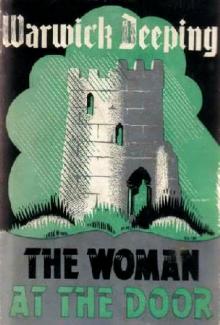 The Woman at The Door
The Woman at The Door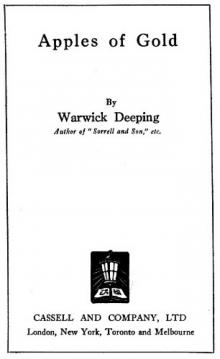 Apples of Gold
Apples of Gold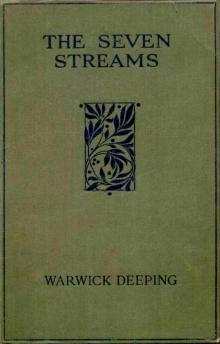 The Seven Streams
The Seven Streams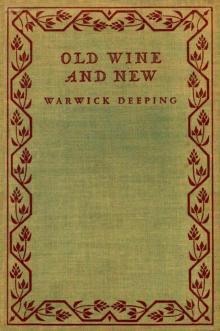 Old Wine and New
Old Wine and New No Hero-This
No Hero-This Two in a Train
Two in a Train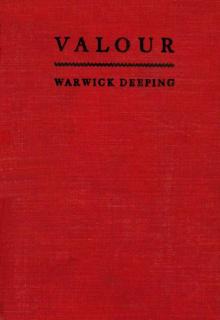 Valour
Valour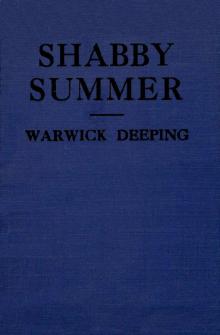 Shabby Summer
Shabby Summer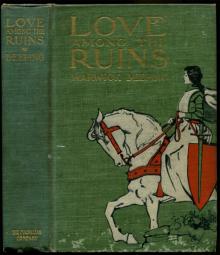 Love Among the Ruins
Love Among the Ruins The Short Stories of Warwick Deeping
The Short Stories of Warwick Deeping